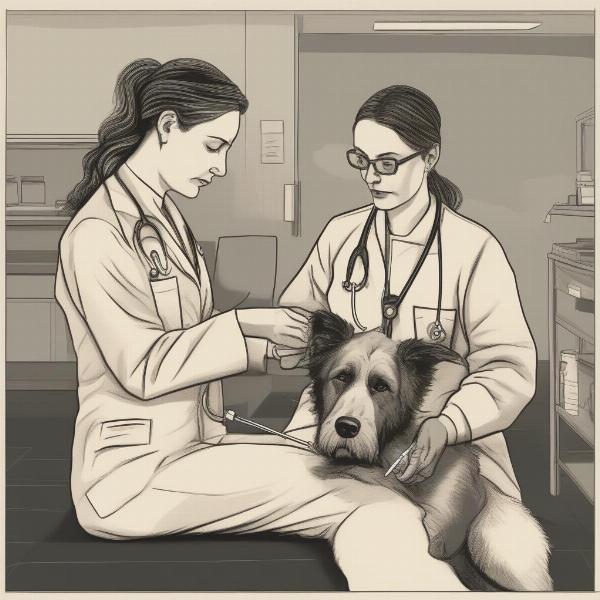Morphine is a powerful opioid pain reliever that is sometimes used in veterinary medicine, including for dogs. Understanding the uses, risks, and crucial considerations surrounding dogs and morphine is essential for responsible pet ownership. This guide delves into the intricacies of morphine administration in dogs, offering insights into its appropriate usage, potential side effects, and responsible pain management strategies.
Understanding Morphine and Its Use in Dogs
Morphine is primarily prescribed for managing moderate to severe pain in dogs, often following surgery, trauma, or in cases of chronic pain conditions like cancer. It works by interacting with opioid receptors in the brain and spinal cord, effectively blocking pain signals. While effective, morphine is a controlled substance with potential for dependence and misuse, necessitating careful veterinary supervision.
 Dog Receiving Morphine Injection at the Vet
Dog Receiving Morphine Injection at the Vet
Potential Side Effects and Risks of Morphine in Dogs
While morphine can be a valuable pain management tool, it carries potential side effects, including:
- Respiratory Depression: Slowed breathing is a serious side effect requiring immediate veterinary attention.
- Sedation: Drowsiness and lethargy are common.
- Constipation: Morphine slows down the digestive system.
- Nausea and Vomiting: These can occur, especially with initial doses.
- Addiction: Prolonged use can lead to physical dependence.
Administering Morphine to Dogs: Dosage and Precautions
Morphine should only be administered under the strict guidance of a veterinarian. The dosage and frequency will vary depending on the dog’s weight, condition, and pain level. Never administer human morphine to a dog, as the formulations and dosages are different. Always follow your veterinarian’s instructions precisely.
Alternatives to Morphine for Pain Management in Dogs
Several non-opioid pain medications and alternative therapies are available for dogs. These include:
- Non-Steroidal Anti-Inflammatory Drugs (NSAIDs): These are commonly used for mild to moderate pain.
- Gabapentin: This medication can help with nerve pain.
- Tramadol: Another opioid option, generally considered less potent than morphine.
- Acupuncture and Physical Therapy: These can provide pain relief and improve mobility.
Recognizing Signs of Morphine Overdose in Dogs
Knowing the signs of a morphine overdose is crucial. These include:
- Severely Slowed Breathing or Difficulty Breathing
- Loss of Coordination
- Seizures
- Unconsciousness
If you suspect your dog has overdosed on morphine, seek immediate veterinary emergency care.
Conclusion
Morphine can be an effective pain management tool for dogs under careful veterinary supervision. Understanding the potential risks, side effects, and proper administration is crucial for responsible pet owners. Always consult your veterinarian for guidance on pain management options for your dog and never self-medicate.
FAQ
- Is morphine safe for dogs? Morphine can be safe for dogs when prescribed and administered correctly by a veterinarian.
- Can my dog become addicted to morphine? Yes, prolonged use can lead to physical dependence.
- What are the signs of morphine overdose in dogs? Severely slowed breathing, loss of coordination, seizures, and unconsciousness.
- Are there alternatives to morphine for dogs? Yes, NSAIDs, gabapentin, tramadol, and alternative therapies like acupuncture are available.
- What should I do if my dog accidentally ingests morphine? Contact your veterinarian or an emergency animal hospital immediately.
- Can I give my dog human morphine? No, never give human morphine to a dog.
- How long does the effect of morphine last in dogs? The duration varies depending on the dosage and individual dog, typically several hours.
ILM Dog: Your Partner in Pet Care
ILM Dog is a leading online resource for dog owners worldwide, offering expert advice on dog breeds, health, training, nutrition, grooming, and more. We are committed to providing reliable and practical information to help you provide the best possible care for your canine companion. Whether you are a new dog owner or an experienced one, ILM Dog has the resources you need. Contact us today for expert guidance: Email: [email protected], Phone: +44 20-3965-8624.